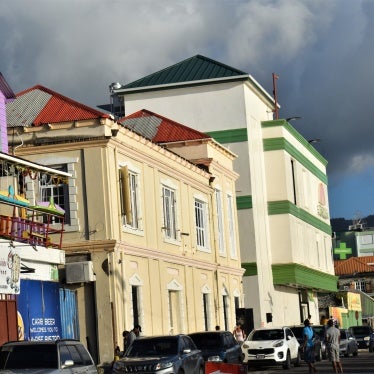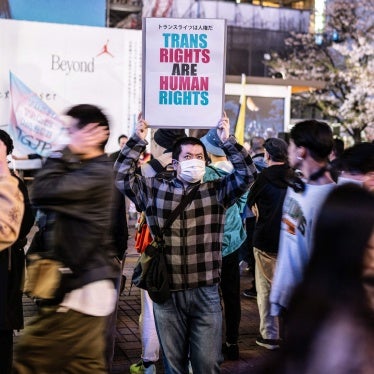“While some progress has been made since the first study in 2011, the overall picture remains one of continuing, pervasive, violent abuse, harassment and discrimination affecting LGBT and intersex persons in all regions. These constitute serious human rights violations, often perpetrated with impunity, indicating that current arrangements to protect the human rights of LGBT and intersex persons are inadequate.”[1]
Amnesty International and Human Rights Watch welcome the report of the Office of the United Nations High Commissioner for Human Rights on “Discrimination and violence against individuals based on their sexual orientation and gender identity”[2], which will be presented to the upcoming session of the UN Human Rights Council (HRC).
Our organisations commend the OHCHR for its activities to combat discrimination and violence against individuals who are, or are perceived to be, lesbian, gay, bisexual, transgender or intersex (LGBTI) around the world, as well as for the promotion of good practices to address and prevent violations and abuses faced by such individuals; such good practices are emerging in all regions of the world.
We also commend the HRC on its attention to the specific human rights violations and abuses faced by individuals because of their real or perceived sexual orientation or gender identity. We urge it to remain seized of this issue.
This statement highlights some of our concerns about this issue, with a focus on recommendations to the HRC.
Arrests and police harassment
Some 76 countries retain laws criminalizing consensual sexual activity between adults of the same sex. Despite the 1994 Human Rights Committee decision in Toonen v. Australia[3] that these laws violate the right to privacy, as guaranteed in the International Covenant on Civil and Political Rights, they continue to be applied. Our organisations have documented arrests and convictions under these laws.[4]
The authorities in every country have a responsibility to protect all individuals from violations and abuses of their human rights and to hold those responsible for such violations and abuses to account. Yet we continue to document incidents of threats and beatings perpetrated by state officials with impunity against individuals because of their real or perceived sexual orientation.[5]
Discrimination, harassment and violence
There continue to be high levels of discrimination, harassment and even violence against individuals who are – or are perceived to be – LGBTI. There have been cases of LGBTI individuals being evicted from their homes, fired from their employment, denied healthcare, and rejected by their families, simply because of their sexual orientation or gender identity.[6] In some cases, these human rights abuses have been linked to existing or new pieces of restrictive legislation, which create a hostile environment for individuals who are or are perceived to be LGBTI. [7]
Where laws criminalizing same sex conduct exist, even if they are not enforced, they intimidate and stigmatise persons who are – or are perceived to be – LGBTI and legitimize the actions of attackers. Yet despite the fact that these laws violate human rights, they exist in some 76 countries around the world, and in some cases, are even being made more repressive.
Even when individuals are not themselves targeted for arrest or police harassment, the existence of such laws may have a negative impact on the ability to access housing, employment, or healthcare services.[8]
We continue to document cases in which homophobic or transphobic threats, harassment, or violence, including killings, have not been adequately investigated by the authorities, and where the perpetrators have not been brought to justice. This climate of impunity for homophobic and transphobic attacks further marginalizes LGBTI persons in numerous countries in all regions of the world.[9]
Torture and cruel, inhuman and degrading treatment
Incidents of LGBTI individuals being subjected to torture or cruel, inhuman or degrading treatment continue. In some of those cases – for example, where individuals arrested under criminal laws are subjected to forced and medically unnecessary anal examinations on account of their real or perceived sexual orientation – the treatment to which they are subjected to is tantamount to torture.[10]
The existence of laws criminalizing consensual sex between adults of the same sex is inherently degrading and creates a chilling effect on the lives of individuals who are – or are perceived to be – gay or lesbian.
Legal gender recognition
Many transgender individuals are not able to obtain legal recognition of their gender, leaving them unable to participate fully in society and in many cases vulnerable to discrimination, harassment or even violence. Even where procedures for legal gender recognition exist, in many countries, they require compulsory surgical intervention, mental health diagnoses, or even forced sterilization. This compels transgender individuals to choose between their reproductive rights and their right to recognition of their identity before the law.[11] We welcome the positive developments in this area that have been made in recent years, notably in Argentina, Denmark and Malta.[12]
Freedom of expression, assembly and association
There continue to be violations of the rights to freedom of expression, assembly and association for LGBTI persons worldwide. Laws explicitly targeting LGBTI individuals or human rights defenders are used to curtail or prevent the activities of those working for the human rights of LGBTI persons – or even just providing information and support.[13]
In many countries, Pride marches or other public demonstrations by or in support of LGBTI individuals have been banned by the authorities, or cancelled because of fears that the authorities would not be able to adequately protect participants.[14] In some cases, private meetings and workshops held by human rights defenders are at risk of being targeted by authorities.[15]
Amnesty International and Human Rights Watch urge the HRC, its members and observer states to call on all states to:
- Act on the recommendations in the OHCHR reports on “Discrimination and violence against individuals based on their sexual orientation and gender identity” (A/HRC/29/23) and on “Violence and discrimination against individuals based on their sexual orientation and gender identity” (A/HRC/19/41);
- Release immediately and unconditionally all individuals who have been detained under laws criminalizing consensual sex between adults of the same sex, and immediately cease arrests under these laws;
- Repeal laws criminalizing consensual sex between adults of the same sex;
- Ensure that all allegations and reports of human rights violations and abuses based on sexual orientation or gender identity are promptly and impartially investigated, and that perpetrators, including state actors, are brought to justice;
- Take all necessary legislative, administrative and other measures to prohibit and eliminate discriminatory treatment on the basis of sexual orientation or gender identity;
- Put an end to torture and other cruel, inhuman or degrading treatment or punishment of LGBTI persons in law and in practice;
- Stop the harassment of and ensure the adequate protection of human rights defenders at risk because of their work on sexual orientation or gender identity;
- Respect the right of all persons to exercise their freedom of expression, assembly and association regardless of their sexual orientation or gender identity without discrimination;
- Allow individuals who wish to change their legal gender in accordance with their own sense of their gender identity to do so through a quick, transparent and accessible procedure which does not in itself violate human rights;
- Ensure that LGBTI persons who have suffered human rights violations or abuses are able to access appropriate remedies.
We call on the HRC to play its part. The violations described here are systemic, and require systemic responses. The HRC should adopt a resolution to ensure regular reporting, constructive dialogue and sustained attention to the breadth of human rights violations and abuses on the grounds of sexual orientation and gender identity.
[1] A/HRC/29/23, 4 May 2015, paragraph 76.
[2] A/HRC/29/23.
[3] CCPR/C/50/D/488/1992 (1994).
[4] e.g. AI: ‘Making Love a Crime: Criminalization of Same-Sex Conduct in Sub-Saharan Africa;’ AI: ‘Rule By Law: Discriminatory Legislation and Legitimized Abuses in Uganda;’ HRW: ‘It’s Nature, Not a Crime: Discriminatory Laws and LGBT People in Liberia;’ HRW: ‘It's Part of the Job’: Ill-treatment and Torture of Vulnerable Groups in Lebanese Police Stations.’
[5] e.g. ‘Making Love a Crime;’ AI: ‘Belarus: Out in the Open;’ HRW: ‘’Treat Us Like Human Beings’: Discrimination against Sex Workers, Sexual and Gender Minorities, and People Who Use Drugs in Tanzania;’ HRW: ‘They Said We Deserved This’: Police Violence Against Gay and Bisexual Men in Kyrgyzstan’
[6] e.g. HRW: ‘I’m Scared to Be a Woman’: Human Rights Abuses Against Transgender People in Malaysia;’ HRW: ‘Not Safe at Home: Violence and Discrimination against LGBT People in Jamaica’ .
[7] e.g. ‘Rule By Law;’ AI: ‘Gambia fails to heed UN warnings on deteriorating human rights;’ HRW: ‘License to Harm: Violence and Harassment against LGBT People and Activists in Russia’ .
[8] e.g. ‘Rule By Law’ .
[9] e.g. AI: ‘Because of who I am: Homophobia, transphobia and hate crimes in Europe;’ ‘Rule By Law;’ ‘I’m Scared to Be a Woman;’ ‘Treat Us Like Human Beings;’ ‘They Said We Deserved This’ .
[10] e.g. AI: ‘Making Love a Crime;’ HRW: ‘‘They Hunt Us Down for Fun’: Discrimination and Police Violence Against Transgender Women in Kuwait;’ ‘‘Treat Us Like Human Beings;’ ‘It's Part of the Job’.
[11] e.g. AI: ‘The State Decides Who I Am: Lack of Legal Gender Recognition for Transgender People in Europe;’ HRW: ‘Controlling Bodies, Denying Identity’
[13] e.g. ‘License to Harm’.
[14] e.g. AI: ‘Ukraine Pride cancelled after police fail to guarantee protection;’ HRW: ‘Dispatches: No Parade, but Pride Perseveres in South Korea’ .
[15] See for example: AI: ‘Uganda: Government raid on LGBT rights workshop;’ HRW: ‘Cameroon: LGBT Rights Workshop Shut Down’.








